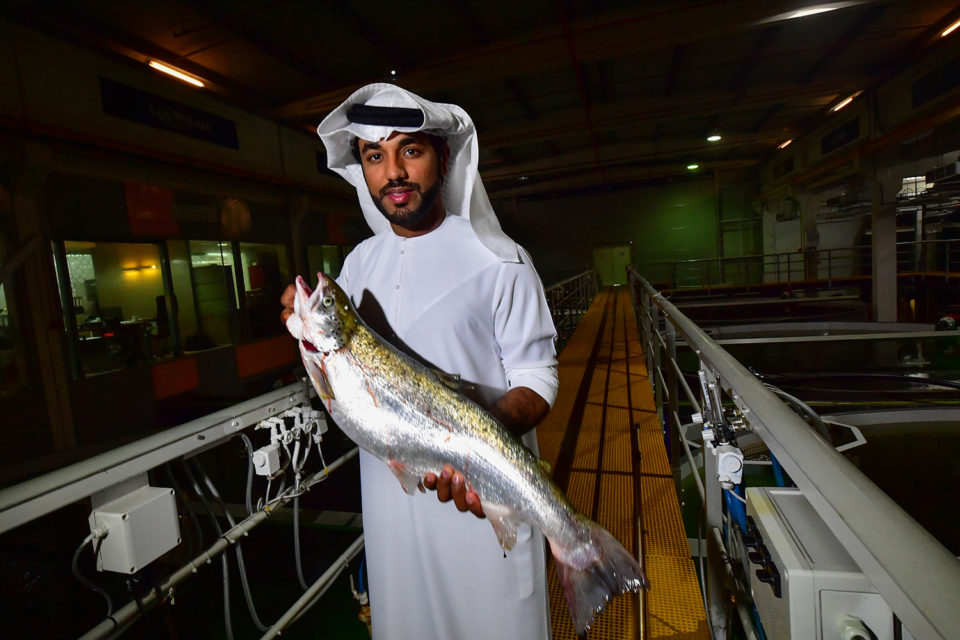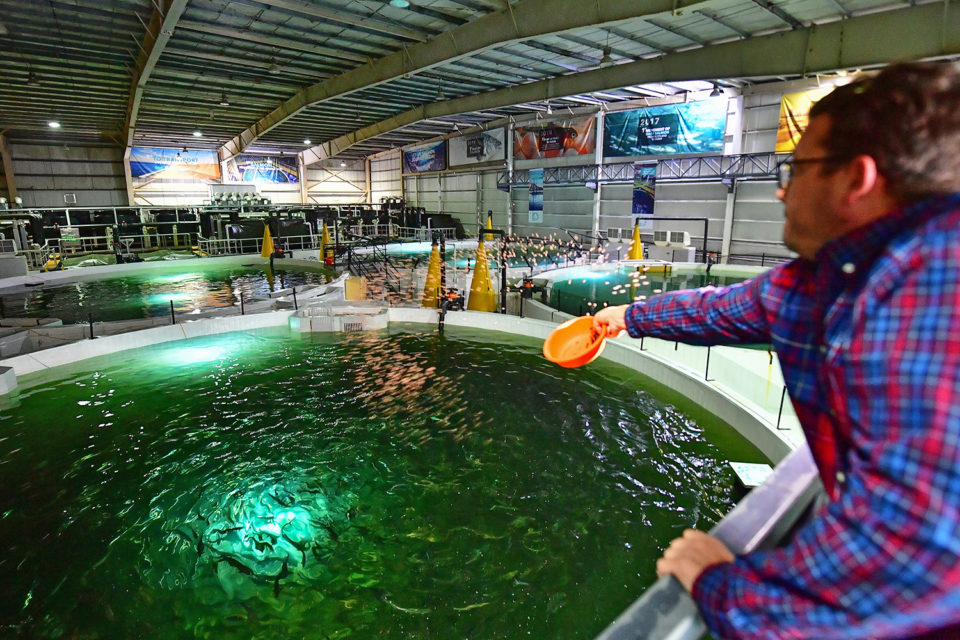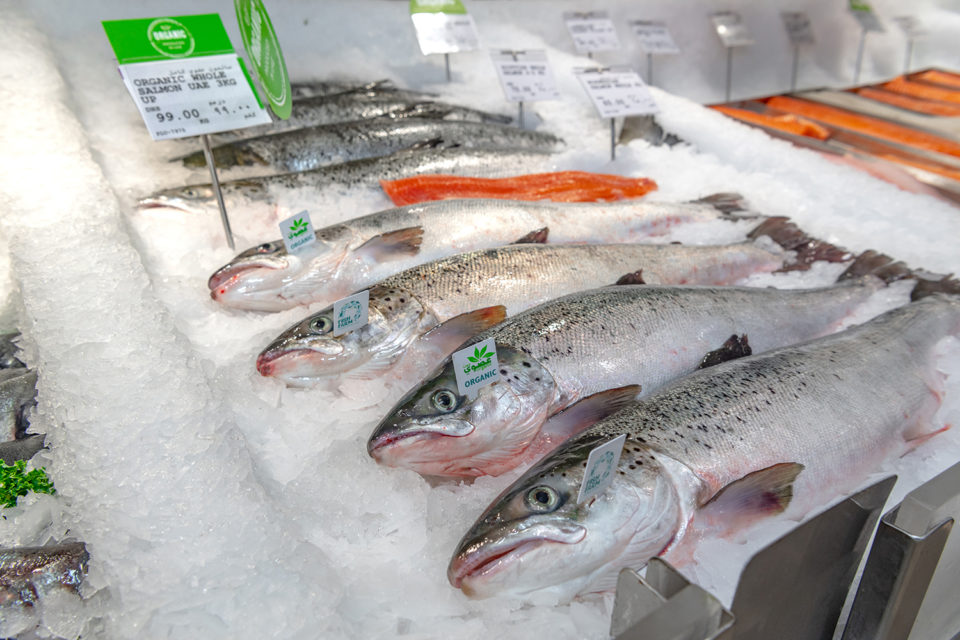Eyeing the sector as a key component of its food security system, the UAE is all-in on RAS

When you think of salmon farming, you probably picture net pens in icy cold waters surrounded by snowy hilltops, like in Norway or Chile, or the rugged coastal backdrops of British Columbia or Scotland’s Shetland Islands.
You might not imagine such activity in the Middle East, but salmon farms are also taking root here, like in the United Arab Emirates, where one company in Dubai is rearing the country’s first homegrown Atlantic salmon.
Fish Farm LLC has spent the past seven years growing sea bream, sea bass, shrimp and yellowtail kingfish. Its focus on marine fish breeding and hatcheries is part of the UAE’s efforts to reduce its dependency on imported fish. Fish Farm began in 2013 with 80 sea cages along the Fujairah Coast containing sea bream and hamour, a local species of grouper. Another 20 hamour cages followed, along with a hatchery in Umm al-Quwain and a RAS facility in Dubai’s southern district of Jebel Ali.
Soon, Atlantic salmon farming became a reality and in 2019 Fish Farm sold the first batch of salmon that was born and bred in the UAE.
“Farming salmon was the strategic vision of HE Sheikh Hamdan, the Crown Prince of Dubai,” Edmund Broad, business development manager at Fish Farm, told the Advocate. “After a successful first attempt, experts were brought in from across the globe for further guidance. We also have a Food Security Initiative in that we work closely with the Future Food Security Minister in terms of aquaculture strategy.”

For the first salmon harvest, around 40,000 fingerlings (parr and smolts) were flown in from a hatchery in Loch Fyne, Scotland, using specialised transport tanks, according to Nigel Lewis, aquaculture and technical director at Fish Farm. This was followed by thousands more eggs from Iceland. After egg incubation, hatching and rearing in Fish Farm’s salmon hatchery, juveniles are moved to the recirculating aquaculture system (RAS) facility in Jebel Ali, where they start off in freshwater tanks in the nursery followed by large, seawater grow-out sections.
Fish Farm has 34 tanks, of which four are used for salmon rearing. The 16-meter-diameter tanks are 4.5 meters deep, while the freshwater system constitutes another eight tanks. The salmon are fully grown and ready for harvest in around 22 to 24 months. Six to eight hundred tons are produced each year.
“In both phases, the salmon are fed the best feed available and to a dynamic feeding regime,” said Lewis. “Water quality parameters are constantly monitored with electronic sensors, which feed data to a central control system that adjusts each parameter to keep them at optimal levels for fish health, welfare and growth.
“RAS is extremely high-tech and we did face a number of technical challenges, but I am very satisfied to say that we have overcome these in our three plus years of operating several systems in the UAE.”
In terms of food security risk, the UAE is quite high up so it’s taking things very seriously.
Led by chief executive Bader Mubarak, Fish Farm is part of the UAE government’s efforts to wean the country off its dependence on imports and equip its population with the tools to produce its own food.
“Ninety-two percent of fish consumed in the UAE is imported,” said Mubarak. “The opportunity for us to fulfill the demand for imports is enormous and there is a huge chance to develop both land and marine-based aquaculture here. Our goal is to do this internally so that we have food security. Dubai is an extremely suitable location for fish farming and an excellent trade hub with major ports and airlines. There are also no other substantial fish farming operations here and no salmon aquaculture so we have the pick of locations.
“Three-quarters of food consumed here is imported, and of that 75 percent another three-quarters comes in via India, Brazil and other countries,” Mubarak continued. “In terms of food security risk, the UAE is quite high up so it’s taking things very seriously.”
Food security is only a recent preoccupation for the UAE, with the Ministry for Future Food Security set up only two years ago. As the country’s population is expected to reach 11.5 million by 2025 (9.4 million in 2017), the ministry is determined to improve food production, and because the desert is a difficult place to farm, high-tech solutions like RAS are drawing attention.
Fish Farm hopes to show how technologies such as theirs can mitigate the challenges of the natural environment. Describing RAS as “the future of salmon farming,” Lewis said that controlling parameters such as temperature, salinity, oxygen, pH and currents, and having no exposure to storms or sea lice, are huge advantages that are key to making fish farming profitable. Fish Farm is also incorporating eco-friendly solutions by using solar energy, taking advantage of the sun’s resources.

Despite its unnatural origins, Fish Farm’s salmon is marked “100 percent organic” thanks to the absence of antibiotics and pesticides. Now proving to be commercially viable, the company has signed a deal to sell its fillets and whole salmon at supermarkets including UAE chain Spinneys. Plans to sell to local restaurants and produce smoked salmon are also in the pipeline. Customers are happy to pay for traceable, fresh produce, the company believes, while transport costs are low since the farm sited in proximity to its primary market.
For Fish Farm, encouraging fish consumption in the UAE is just as important. This is done through press and local marketing initiatives, while the fish are sold with a tag indicating that they’re less than 12 hours from harvest, a quick and easy way for consumers to identify fresh fish. Other initiatives are also under way, for example differentiating locally grown from imported.
With the correct technology, manpower, government support and long-term capital, Broad believes that there is no reason why the UAE can’t grow its own food and export it around the region. Talks are also underway for Fish Farm to eventually produce its own feed, while a much bigger facility in future is likely to have a good chance of competing with the Norwegian salmon sector on price.
Follow the Advocate on Twitter @GAA_Advocate
Now that you've finished reading the article ...
… we hope you’ll consider supporting our mission to document the evolution of the global aquaculture industry and share our vast network of contributors’ expansive knowledge every week.
By becoming a Global Seafood Alliance member, you’re ensuring that all of the pre-competitive work we do through member benefits, resources and events can continue. Individual membership costs just $50 a year. GSA individual and corporate members receive complimentary access to a series of GOAL virtual events beginning in April. Join now.
Not a GSA member? Join us.
Author
-

Bonnie Waycott
Bonnie Waycott is a freelance writer specializing in aquaculture development and fisheries management, with a particular focus on Japan. She has a keen interest in the recovery of aquaculture in Tohoku, following the Great East Japan Earthquake and Tsunami of March 2011.
Tagged With
Related Posts

Responsibility
Can ranching ‘zombie urchins’ boost uni, save kelp forests?
With Norwegian knowledge and a partnership with Mitsubishi, Urchinomics aims to turn worthless empty urchins into valuable seafood while restoring kelp forests and creating jobs.

Innovation & Investment
Is RAS the game-changer that Europe’s aquaculture sector needs?
The impact that recirculating aquaculture systems, or RAS, will have on European production remains to be seen, but the general vibe is positive.

Intelligence
RAS in the USA: Fad or future?
A rash of large-scale, land-based recirculating aquaculture systems (RAS) are planting their flags on U.S. soil, even though it will take several years and hundreds of millions of dollars of investment before they produce their first sellable fish.

Health & Welfare
Comparing biofloc, clear-water and hybrid RAS systems as tilapia nurseries
This study examined differences in fish performance and water quality dynamics between biofloc, clear water and hybrid systems as nurseries for tilapia.

